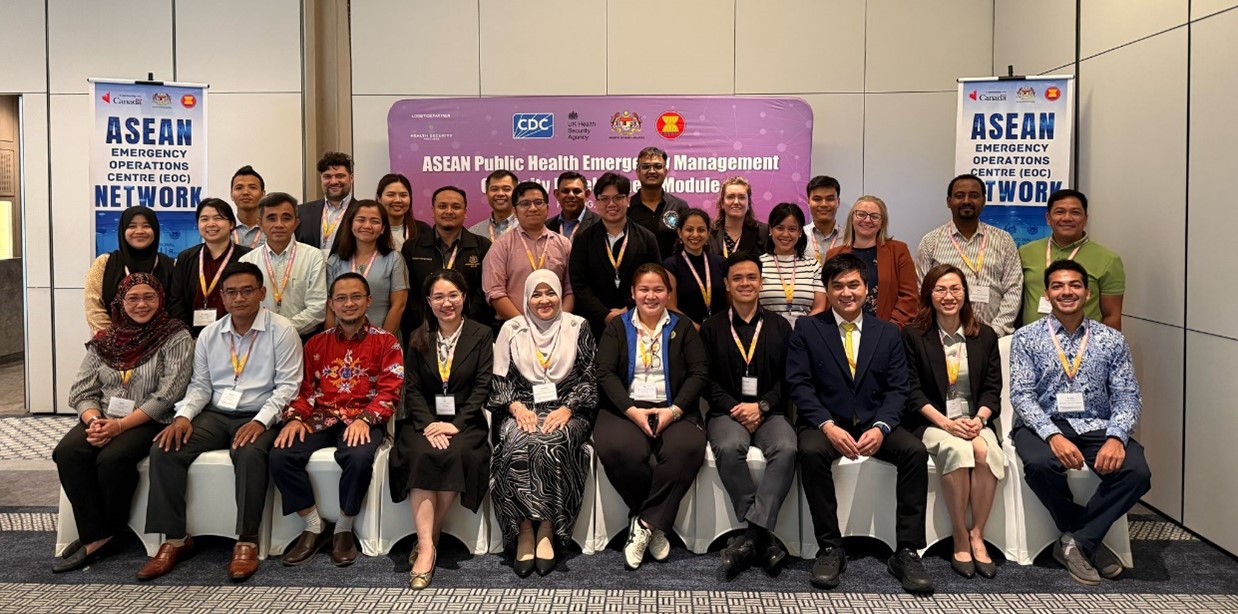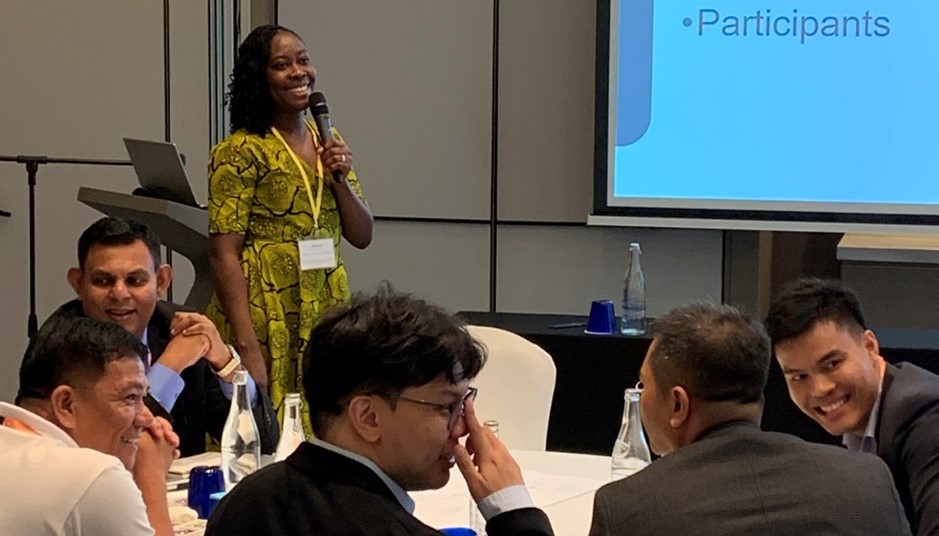
The UK Health Security Agency (UKHSA) International Health Regulations Strengthening Project (IHR-SP) has been supporting the Association of South East Asian Nations (ASEAN) to improve their public health response capabilities. Working alongside partners including the US Centre for Disease Control (CDC) and the Justice Institute of British Columbia (JIBC), UKHSA helped develop an innovative programme to identify and develop future leaders in public health across the region, known as the Public Health Emergency Management Emerging Leaders Programme (PHEM ELP).
This programme provides mid-level public health professionals from across ASEAN Member States a grounding in the specialist skills required for public health preparedness, resilience and response. The 7-week course is modelled on the Public Health Emergency Management (PHEM) Fellowship successfully delivered by the CDC in Atlanta. UKHSA IHR-SP’s Emergency Preparedness, Response and Resilience (EPRR) Technical Advisers shaped the course through the design and delivery of an outline train the trainer module and the delivery of a simulation exercise to implement all the Public Health Emergency Operations Centre (PHEOC) skills learned in the programme’s other modules.
Embedding sustainability
Building on the successes and learnings from the first and second cohorts, UKHSA and ASEAN wanted to address the critical need for future sustainability of the PHEM ELP. Using regional ASEAN facilitators and developing local expertise helps embed ASEAN culture and working approaches within the PHEM ELP curriculum, supporting long-term relevance and ownership. UKHSA also designed a capacity development module to enhance the facilitation skills of PHEM ELP graduates, enabling them to independently lead future courses. Alongside this, it was identified that equipping participants with the skills to design and deliver simulation exercises would be advantageous to the region’s long-term public health emergency preparedness capabilities.
The next step for the programme is to maintain and develop the participants’ facilitation skills gained in the capacity development module. The UKHSA EPRR team is working alongside ASEAN to coach participants in the delivery of the simulation exercise module and other PHEM modules, as well as offering mentoring conversations. A proposed simulation exercise course will also provide participants from the capacity development module with the opportunity to act as lead instructors, coached by UKHSA EPRR staff. The long term goal of this training is to develop a cohort of instructors who can design and develop a PHEM ELP programme that is sustainably resourced within the region.
 Image: ASEAN's Public Health Emerging Leaders participants
Image: ASEAN's Public Health Emerging Leaders participants
Sharing expertise from beyond the region
In a first for the ASEAN PHEM ELP, UKHSA was able to leverage the global expertise of its IHR-SP country-based colleagues from outside the region. This innovative approach brought together specialists from across UKHSA’s international network: Dr Dingase Mvula, EPRR Technical Advisor for Zambia who co-delivered the Simulation Exercise module, whilst Dr Dagu Tolossa, EPRR Technical Advisor for Ethiopia co-delivered the Facilitation Skills module. Each instructor adapted the original module delivery methodology and activities so that the course reflected their unique voice and experiences.
This cross-regional adaptation created valuable two-way learning opportunities, enabling ASEAN colleagues to learn from diverse expertise and experiences from other global contexts, whilst allowing UKHSA’s IHR-SP team to gain insights from ASEAN partners. The programme was additionally coordinated and supported by UKHSA’s UK-based EPRR team.
 Image: Dr Dingase Mvula,IHR-SP Technical Advisor for Zambia co-delivering the simulation exercise module
Image: Dr Dingase Mvula,IHR-SP Technical Advisor for Zambia co-delivering the simulation exercise module
Reflections from Dr Dingase Mvula
Zambia’s participation in the ASEAN PHEM ELP delivered significant learning opportunities. Given Zambia’s recent experience with a chemical spill in the Copperbelt, the insights gained from Malaysia and Thailand on chemical responses and simulations proved especially valuable and directly applicable to Zambia’s national context.
The training also reinforced the importance of regional collaboration. Engaging with professionals from diverse backgrounds fostered a deeper understanding of different emergency response across the region and brought to light how harmonised protocols and coordinated regional action during public health emergencies could be adapted for Zambia, but also the broader African context.
Based on these learning experiences, some key recommendations from the ASEAN PHEM ELP training for Zambia are:
- Train a pool of national facilitators in Zambia in exercise design and delivery to ensure sustainability and scalability of simulation exercises across the country.
- Target participants trained in PHEM to reinforce and operationalise PHEM knowledge through a realistic and multi-sectoral simulation exercises.
- Make post-exercise evaluation and improvement planning a mandatory component of all simulations which will help identify systemic weaknesses and track progress over time.
- Leverage global and regional expertise to foster mutual learning.
Reflections from Dr Dagu Tolossa
Lessons identified from the ASEAN PHEM ELP that could be adopted for Ethiopia include:
- Integrate facilitation skills into PHEM related trainings - a significant part of the PHEM roles is to share learning. Having facilitation skills to enhance the sharing of lessons will develop the PHEM course in Ethiopia.
- The benefits of regional networking and joint training - the network developed by the ASEAN Member States has created a shared understanding of common protocols and mutually beneficial information across the region. Providing similar training as a regional Emergency Operations Centre (EOC) network is an opportunity for Ethiopia better cross-border public health information sharing. A sub-regional EOC-network along with other eastern Africa countries may be effective and manageable for Ethiopia to provide joint trainings, share information and networking.
- Use of a wide range of teaching methods and use of digital technologies - uilising a range of teaching methods is essential for engaging participants and making the most out of every learning opportunity. Using the right learning tools at the right time is key for tailoring the event to the participant needs. Additionally, digital tools were effective to facilitate trainings and may be of benefit during delivery of similar sessions in Ethiopia.
The valuable lessons identified by IHR-SP through the ASEAN PHEM ELP will be integrated into knowledge sharing with EPRR colleagues in Ethiopia and Zambia, ensuring these insights enhance future programme delivery.
Useful Resources
Related Articles
-
First-of-its-kind Community-Based Surveillance Training in Mardan to Boost Pakistan’s Disease Preparedness and response
BY Najma, Mirza Zeeshan Iqbal Baig, Nadia Nisar, Dr Muhammad Sartaj -
IHR-SP supports the Senior Leadership Symposium of the Nigeria Centre for Disease Control and Prevention
BY IHR -
Fourth Regional Training of Trainers on Public Health Emergency Operations Centres in Africa
BY IHR -
Building a stronger health partnership with academic institutions for strengthening IHR in Pakistan: IDSR training for Master Trainers at The Institute of Public Health, Lahore
BY Dr Muhammad Sartaj -
From Nigeria to The Gambia: IHR-SP advances cross-sectoral leadership in public health
BY Paul Irabor
Please Sign in (or Register) to view further.